Occultism, Witchcraft & Cultural Fashions: Essays in Comparative Religion by Mircea Eliade

Author:Mircea Eliade [Eliade, Mircea]
Language: eng
Format: azw3
Tags: Spirituality, History, Philosophy, Nonfiction, Religion
ISBN: 9780226203928
Publisher: University of Chicago Press
Published: 1976-01-01T00:00:00+00:00
6
Spirit, Light, and Seed
In an article written in 1957, I discussed a number of experiences, mythologies, and speculations related to âmystical light.â1 My main design was to establish a morphology that would facilitate a relevant comparative analysis. Essentially, the essay had a methodological intention, namely, to show that only by comparing similar religious phenomena can one simultaneously grasp their general structure and their particular, specific meanings. I have chosen to investigate the experiences and ideologies of âmystical lightâ precisely because of their extensive distribution in space and time. Indeed, we have at our disposal a large number of examples from different religions, not only archaic and Oriental but from the three monotheistic traditions, Judaism, Christianity, and Islam. What is even more significant, there also exists a rich documentation relating to spontaneous or ânaturalâ experiences of inner light, that is, experiences undergone by individuals without any ascetic or mystical preparation and apparently even without religious interests.
I do not intend to summarize here the results of my investigation. As could be expected, the morphological similarities and differences among such experiences point to distinct, but comparable, religious or theological meanings. If I may quote from my concluding remarks, all types of light-experiences have this factor in common:
they bring a man out of his profane universe or historical situation, and project him into a universe different in quality, an entirely different world, transcendent and holy. The structure of this holy and transcendent Universe varies according to a manâs culture and religion. Nevertheless they share this element in common: the Universe revealed through a meeting with the Light contrasts with the profane Universeâor transcends itâby the fact that it is spiritual in essence, in other words only accessible to those for whom the Spirit exists. The experience of Light radically changes the ontological condition of the subject by opening him to the world of the Spirit. In the course of human history there have been a thousand different ways of conceiving or valorizing the world of the Spirit. That is evident. How could it have been otherwise? For all conceptualization is irremediably linked with language, and consequently with culture and history. One can say that the meaning of the supernatural Light is directly conveyed to the soul of the man who experiences itâand yet this meaning can only come fully to his consciousness clothed in a preexistent ideology. Here lies the paradox: the meaning of the Light is, on the one hand, ultimately a personal discovery; and, on the other hand, each man discovers what he was spiritually and culturally prepared to discover. Yet there remains this fact which seems to us fundamental: whatever will be the subsequent ideological integration, a meeting with the Light produces a break in the subjectâs existence, revealing to himâor making clearer than beforeâthe world of the Spirit, of holiness and of freedom; in brief, existence as a divine creation, or the world sanctified by the presence of God.2
The different light-experiences discussed in my essay, with the exception of the few spontaneous ones, were constantly valorized in their traditional contexts.
Download
This site does not store any files on its server. We only index and link to content provided by other sites. Please contact the content providers to delete copyright contents if any and email us, we'll remove relevant links or contents immediately.
The Lost Art of Listening by Michael P. Nichols(6462)
Why I Am Not A Calvinist by Dr. Peter S. Ruckman(3767)
The Rosicrucians by Christopher McIntosh(3046)
Wicca: a guide for the solitary practitioner by Scott Cunningham(2702)
Signature in the Cell: DNA and the Evidence for Intelligent Design by Stephen C. Meyer(2496)
Real Sex by Lauren F. Winner(2466)
The Holy Spirit by Billy Graham(2408)
To Light a Sacred Flame by Silver RavenWolf(2350)
The End of Faith by Sam Harris(2279)
The Gnostic Gospels by Pagels Elaine(2023)
Nine Parts of Desire by Geraldine Brooks(2002)
Waking Up by Sam Harris(1953)
Heavens on Earth by Michael Shermer(1950)
Devil, The by Almond Philip C(1896)
Jesus by Paul Johnson(1882)
The God delusion by Richard Dawkins(1843)
Kundalini by Gopi Krishna(1821)
Chosen by God by R. C. Sproul(1754)
The Nature of Consciousness by Rupert Spira(1687)
